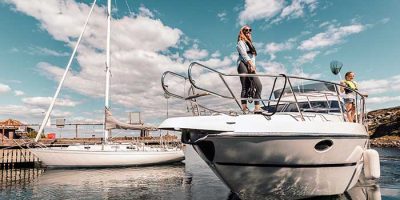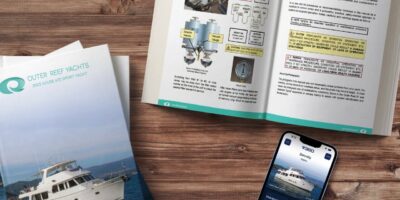Marine Lubricants
The array of engine and drive lubricants, oils, sprays, and fuel treatments at your local marine parts store or dealer can be intimidating.
- February 8, 2024
Engine Oil
Obviously for four-stroke engines or inboards, this goes in the engine crankcase to lubricate the inner workings (crankshaft, pistons, rings, bearings, and camshaft). In a two-stroke outboard, it’s either poured into the oil injection tank or for older engines, mixed directly with the fuel. Synthetics are typically better and can help your engine last longer, but they’re more expensive. What’s important:
- Buy the right oil for your engine; there are oils specially formulated for inboards and sterndrives (essentially car engines in boats), PWC, and four stroke outboards. There’s also specially formulated oils for two stroke engines, depending on whether the oil is mixed in the fuel or injected from a separate tank. This may be especially important if your engine’s under warranty. Use the manufacturer’s recommended oil if possible.
- Don’t skimp on oil quality. Buy name-brand oils only; look for the TC-W3 rating on outboard oils. You may save a few bucks on the oil, but if it damages your engine, that cost far outweighs any savings.
Grease
Waterproof, synthetic extreme-duty grease is best for lubricating engine steering and trim/tilt pivot points as well as trailer bearings. Keep a spare grease gun and a few cartridges handy in your tow vehicle in case of emergency or just to top off. Don’t mix different types of greases, especially waterproof with non-waterproof, and synthetic with non-synthetic. Buy good quality grease, correct for your application, and stick with it.
Fuel Treatment
Very important stuff — this can save a lot of headaches caused by high ethanol content in fuel, or injector/carburetor gumming and contamination problems caused by long layups (longer than a couple months). If you can, use it at every fill up, or at least every other, and especially if you know you’re not going to use your boat for a while. It’s inexpensive and really does help keep your boat’s fuel system clean.
Gearcase/Drive Lubricant
As with engine oil, buy the right stuff for your drive. Synthetics are better and can help the gears and bearings in your drive/gearcase last longer, but are more expensive. Ask your dealer if you are in doubt.
Engine Tuner, Decarbonizer
Affectionately called “engine tune-up in a can” this solvent helps keep piston rings and pistons in both two-stroke and four-stroke engines from “coking” with hard carbon deposits, which can lead to loss of compression (and resulting loss of power), and end in engine failure. Apply liberally once per season and your engine will last longer with more power.
Electrical Protectant
This is typically available at marinas and auto-parts stores. Spraying this on the engine’s electrical parts (coils, spark plug wires, etc.) can help provide a “film” to inhibit corrosion, brittleness, and other signs of aging. It’s particularly helpful in saltwater.
Power Trim/Tilt and Power/Hydraulic Steering Fluid
Be especially careful here. For sure, buy only what your unit’s manual and your dealer recommend, and don’t mix types, brands or purposes. Don’t use power trim fluid in the hydraulic steering system, for example. Keep an extra bottle handy in your boat’s storage area (in a leakproof storage container), and in your garage or shop to top off if necessary.
Fogging Oil
Used mainly for winterization and long layup periods, fogging oil is typically sprayed into a gasoline engine’s intake (carburetor or EFI) while the engine is running; as a last resort it can be added to the fuel supply or sprayed into the spark plug holes (while rotating the flywheel slowly by hand). The object is to coat the moving parts (crankshaft, connecting rods and bearings, pistons and cylinders, etc.) with this rust-preventing lubricant for the long winter’s nap.
Marvel Mystery Oil
This stuff really does work wonders, especially for those of us who like to work on old engines. An engine that’s “stuck” (i.e. frozen piston/cylinder due to rust, etc.) will eventually work it’s way free by tipping it up, removing the spark plugs and adding some Marvel oil into the cylinders. It may take days or even weeks, but eventually this stuff will work its way into the rusted rings, bearings and other rotating parts and free them up.
Liquid Lubricants
Such lubricants as silicone spray, WD-40, and similar products can be sprayed just about anywhere moving parts work together. Especially in saltwater environments, these products keep parts from corroding, rusting or sticking together. Great for throttle shafts, tilt levers, engine cowling/cover latches and levers, and of course anywhere on a trailer (winch, tongue jack, lights, etc.)
Never Seez
Used for decades to keep nuts and bolts from binding and galling, Never Seez is great for wheel lug nuts and other similar fasteners you will want to loosen at some future point.
Rust Penetrants
These lubricants are used to loosen stuck bolts, screws and nuts. It’s best to spray them on a stuck part, then wait a bit to allow the penetrant to soak in between the two parts.
Boat owners worth their salt will have these and more in their arsenal of boat and engine maintenance products. Keeping them new is also a must; after a few years of sitting in a locker, they won’t be as effective as when new, so replace as needed.
John Tiger
Contributor, BoatUS Magazine
About Vessel Vanguard
Vessel Vanguard is a leading marine safety and maintenance management software provider dedicated to revolutionizing the maritime industry. With a commitment to innovation and excellence, Vessel Vanguard delivers cutting-edge solutions to streamline operations and enhance vessel performance and safety.
Latest Industry Insights

Embracing E-Boating Efficiencies

Boat Fuel Systems

The Future of Boats & Boating

Yacht Navigation Light Inspection
View All of Our Industry Insights
Navigate maritime with the latest news, practical how-to guides, insightful analyses and more.
